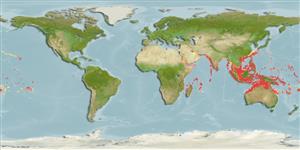Teleostei (teleosts) >
Carangaria/misc (Various families in series Carangaria) >
Sphyraenidae (Barracudas)
Etymology: Sphyraena: Greek, sphyraina, -es = the name of a fish (Ref. 45335).
Eponymy: Johann Reinhold Forster (1729–1798) was a German clergyman in Danzig (now Gdansk, Poland). [...] (Ref. 128868), visit book page.
More on author: Cuvier.
Environment: milieu / climate zone / depth range / distribution range
Ecology
Marine; reef-associated; depth range 6 - 300 m (Ref. 1602). Tropical; 30°N - 23°S, 36°E - 140°W
Indo-Pacific: East Africa to Southeast Asia and the Marquesan and Society islands, north to southern Japan, south to New Caledonia.
Size / Weight / Age
Maturity: Lm ? range ? - ? cm
Max length : 92.3 cm FL male/unsexed; (Ref. 125599); common length : 50.0 cm TL male/unsexed; (Ref. 9768); max. published weight: 4.1 kg (Ref. 125599)
Dorsal spines (total): 6; Dorsal soft rays (total): 9; Anal spines: 2; Anal soft rays: 9. Body elongate and sub cylindrical with small cycloid scales; head long and pointed. Mouth large and horizontal, the tip of the lower jaw protruding; intermaxilla non-protractile. Preoperculum broadly rounded. Lower limb of the first fill arch with spiny tubercles. First dorsal fin origin opposite or before the pectoral tip, the first spine shorter than the second. Color is generally blackish above and silvery below.
Nocturnally active, but occurring in large schools above lagoon patch reefs and along outer reef slopes during the day (Ref. 9768, 48637). Feeds mainly on fishes, but also on penaeid shrimps and squids. Sold fresh, frozen or dried salted. Reports of ciguatera poisoning need confirmation.
Life cycle and mating behavior
Maturity | Reproduction | Spawning | Eggs | Fecundity | Larvae
Rose, J.H., 1984. Sphyraenidae. In W. Fischer and G. Bianchi (eds.) FAO species identification sheets for fishery purposes. Western Indian Ocean (Fishing Area 51). Vol. 4. FAO, Rome. pag. var. (Ref. 4752)
IUCN Red List Status (Ref. 130435: Version 2024-1)
Threat to humans
Reports of ciguatera poisoning (Ref. 30298)
Human uses
Fisheries: commercial
Tools
Special reports
Download XML
Internet sources
Estimates based on models
Preferred temperature (Ref.
123201): 19.4 - 28.2, mean 26.2 °C (based on 976 cells).
Phylogenetic diversity index (Ref.
82804): PD
50 = 0.5000 [Uniqueness, from 0.5 = low to 2.0 = high].
Bayesian length-weight: a=0.00724 (0.00481 - 0.01092), b=2.92 (2.80 - 3.04), in cm total length, based on LWR estimates for this species & Genus-body shape (Ref.
93245).
Trophic level (Ref.
69278): 4.4 ±0.0 se; based on diet studies.
Resilience (Ref.
120179): Low, minimum population doubling time 4.5 - 14 years (Preliminary K or Fecundity.).
Fishing Vulnerability (Ref.
59153): High vulnerability (61 of 100).
Nutrients (Ref.
124155): Calcium = 16 [7, 42] mg/100g; Iron = 0.289 [0.130, 0.614] mg/100g; Protein = 20.1 [18.1, 21.7] %; Omega3 = 0.103 [0.048, 0.214] g/100g; Selenium = 46.3 [20.1, 115.3] μg/100g; VitaminA = 46.7 [10.3, 220.9] μg/100g; Zinc = 0.448 [0.286, 0.779] mg/100g (wet weight);
